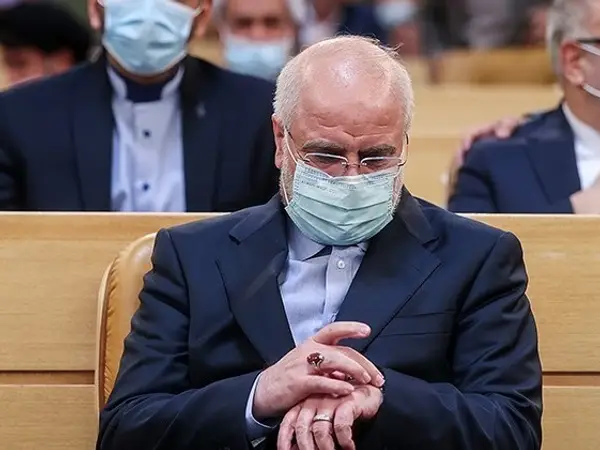A trip by the family of Iran’s parliament speaker abroad to buy baby clothes and accessories has become his latest scandal, prompting calls for his resignation.
Mohammad Bagher Ghalibaf’s wife, daughter and son-in-law arrived at Tehran’s Imam Khomeini airport on Tuesday from Istanbul with apparently a large layette set they bought from Turkey. People at the airport didn’t recognize them at first but when a photo of the family circulated on social media, their identity was revealed, followed by a barrage of criticism, and resurfacing of other alleged corruption cases against the family.
Mohammad Bagher Ghalibaf became parliament speaker in 2020 after 'revolutionary principlists' or hardliners swept an engineered election, when most reformists were banned from running as candidates.
The harsh reaction to the incident is because of the hardship most Iranian face with 40-percent inflation and an eight-fold drop in the value of the national currency, impoverishing tens of millions of middle-class people.
Something that added to the controversy was a video of Ghalibaf in the 2017 presidential debates in which he censured a former minister for traveling to Italy to buy baby clothes. “You people think our economy will get better, never!” Ghalibaf is heard saying in the video.
The word for the layette in Persian is ‘sismuni’ a relic of Sanskrit that has survived in the language from Old Persian. Social media users have added the suffix for political scandals “gate” to it and are sharing the hashtag ‘SismuniGate’ in reference to the Watergate scandal.
In reaction to the latest chapter of Ghalibafs’ scandals, many activists and officials have called for the resignation of the parliament speaker. Reformist political commentator Abbas Abdi, however, says the news is so devastating that as a matter of principle he must resign from all his positions, but his replacement will definitely be worse than him. “So, I do not suggest resignation” he added.
The more important issue here is contradictory behavior by officials, he said, noting that “These paradoxes are not limited to this small case that has been exposed. It has destroyed almost all areas of Iran’s political and social life”.
Another civil activist, Vahid Ashtari, referring to government policies said it is not possible to preach to people to buy Iranian-made cars and other products, ban the import of home appliances, and send your family to Turkey to buy ‘sismuni’.
University professor and political activist Rahmatollah Bigdeli called for Ghalibaf’s to step aside, saying, "Only Ghalibaf's resignation will erase this stain”.
Ghalibaf's son Elias, criticized the trip by his sister, and said, “My sister and her husband did something that is absolutely wrong, especially in the current economic situation people face”. However, he added his father shouldn’t be judged by the actions of his sister, something also echoed by his media assistant, Mohammad Saeed Ahadian.
Ghalibaf is a household name in many corruption cases in the Islamic Republic. During his term as mayor of the capital Tehran, several of his deputies and people in his close circle were sentenced to 20 to 30 years in prison but the judiciary never prosecuted him, maybe because he is a close relative of Supreme Leader Ali Khamenei.
During the same period, Ghalibaf handed over lands with a total area of 71,397 square meters to his wife’s charity institute in 2011, apart from another 2.5 trillion rials, nearly $100 million at the time.
An audio file of Iran’s Revolutionary Guard commanders discussing massive financial corruption that leaked in February also directly involved Ghalibaf.
Some Iranian social media users say the country’s push to restrict the internet in Iran is aimed at preventing the exposure of such scandals by the Islamic Republic’s authorities and their families – especially their relatives who have been making the best use of their position since President Ebrahim Raisi took office.
